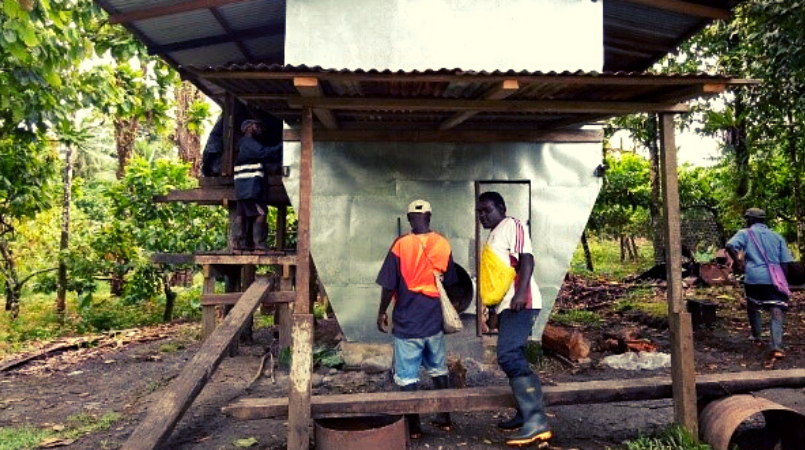
In 2002, Nathan Ambi’s family cocoa farm in Buin, South Bougainville, was devastated by cocoa pod borer.
Though borer eggs are almost invisible to the naked eye, and in their adult form are only a mosquito-sized moth, their presence can cause drastic drops to the quality and quantity of cocoa yields.
They are one of many challenges faced by Bougainville’s smallholder farmers, whose livelihoods depend on slender margins.
“In addition to cocoa pod borer, there are a range of difficulties that affected production – mainly accessing markets and limited technical assistance,” Ambi explained.
These issues are well known to the 33 year-old – a second-generation cocoa farmer – and the other members of the Pahari Farmers Business Group who earn their living by selling cocoa and garden vegetables.
The group was established in 2017 and includes 50 cocoa farmers who pool their resources and knowledge for better agricultural and business outcomes.
Not too far away in Bana District, Christopher Kamanai told a familiar story of an area that in the early 2000s had only just resumed farming following the Bougainville crisis when the borers struck.
“I had seven hectares of cocoa trees and nearly half were affected by cocoa pod borer,” Kamanai said.
“No one knew what to do or how to eradicate the disease.”
Like their counterparts in Buin, Kamanai and the smallholder farmers in Bana decided it was best to work together and in 2010, formed a farming group called the Bana Sustainable Corporative Society.
Both the Buin and Bana groups applied for grants through the Australian and New Zealand government funded Bougainville Partnership Commodity Support Facility, established as part of a broader program to improve the Autonomous Region of Bougainville’s economic and social development.
The Commodity Support Facility has provided financial and technical support to farmers – assisting them to increase the quantity and diversity of their produce and encouraging investment in smallholder and small- and medium-sized enterprises in the primary industries.
The Pahari Farmers Business Group members in Buin were supported to overcome constraints with training on best practice pre- and post-harvest farming techniques and the rehabilitation of old and damaged dryers.
The group was also boosted with a tractor and farming tools and chemicals.
“Farmers have embraced the new farming technology and are applying their skills and knowledge,” Nathan said.
“Training on block management and cocoa sanitation also improved the quantity of yields during the recent harvest.”
The Pahari farmers also received 20,000 new clonal seedlings, with farmers receiving 400 each, which were planted in 2017 and are expected to reduce the amount and severity of future cocoa pod borer infestations.
“The primary advantage of clonal seedlings is that they are pest and disease resistant,” Ambi continued.
“If managed successfully, we are looking at good production of around 50 tonnes in late-2020,” he added.
Over in Bana, members of the Bana Sustainable Corporative Society cooperative were jubilant when they learned their application was successful.
“In 2017, we signed the grant agreement and took part in a two weeks hands-on training in Tokialla Plantation East New Britain provided by Agmark Ltd with the support from the Bougainville Partnership CSF and the PNG Cocoa Board,” Kamanai said.
“Along with other members from 25 farming groups, we learnt new and more efficient farming techniques – cocoa block management, rehabilitation, cocoa sanitation and financial management.”
The cooperative started with 50 farmers and 25 more have joined since its establishment. Farmers were provided with tools, chemicals and fertilisers, 27,000 clonal cocoa seedlings, a solar dryer and a tractor and trailer.
The cocoa industry has its challenges but Kamanai and the collective have remained optimistic.
“The farmers are still harvesting cocoa from old hybrid trees,” Kamanai continued, “the new clonal trees are expected to bear cocoa pods this year and will be ready for harvest in year 2021.
“We want to grow beyond our current capacity and look at cocoa in a holistic way – from farming to marketing – so our farmers receive maximum reward for their labour.”
The governments of Australia and New Zealand are now calling for new proposals from farmer groups interested in being supported to increase cocoa production and quality. Applications opened on 1 June and close 13 July, with forms and eligibility criteria available at the Department of Primary Industries & Marine Resource (DPI) in Buka, district DPI offices, or the Bougainville Partnership office.
(The Pahari group rehabilitates an old fermenter)
